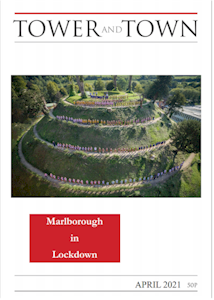

Tower and Town, April 2021 (view the full edition) (view the full edition)A Good ReadTwo very different books this month, but I absolutely loved them both. The Mermaid of Black Conch by Monique Roffey is one of the best books I've read for a while. There are only a handful of potential plots in literature, and one of them is the arrival of a disruptive outsider. In this novel a mermaid - yes, an actual half-woman half-fish mermaid - is the stranger whose presence permanently alters the lives of the characters and their community. It's hard to describe without giving too much away, but the narrative and dialogue are fabulously energetic, textured and fluid, and the author creates a situation which is both supernatural and convincingly realistic. The mermaid is real, but of course she's also a metaphor for migration and displacement, colonialism and exploitation. This is a book which deals compellingly with issues of history, of power and hatred and jealousy and love. Sounds 'clever' and 'literary'? It is, and it won the Costa Book Award last year. It's also immensely readable, original, varied and evocative. Do you know what Sigmund Freud was doing in Trieste in 1876? Studying eels, looking for their testicles, to understand how they reproduce. (He failed.). Yes, folks, it's that time of year again. I'm working my way through the shortlisted books for the Richard Jefferies Society/White Horse Bookshop Prize, and quietly seething with enthusiasm for The Gospel of the Eels by Patrick Svensson. It's a combination of natural science and literary memoir, about the most enigmatic of creatures. The author considers the intangible cultural heritage of eel-fishing communities all around Europe and how he bonded with his father through catching eels in rural Sweden. Despite years of research and study, what we know about eels remains hazy and speculative. We all know, don't we, that they reproduce in the Sargasso Sea? And yet, no-one has ever seen a breeding eel there, and the Sargasso Sea itself remains an elusive place, with no clearly defined limits. We do know that eels appear to be dying out, their numbers diminishing, yet we don't know why. Patrick Svensson draws together science, myth and anthropology in a book that evokes the hypnotic appeal of this mysterious, and to some faintly repulsive animal. There's a strange metaphysical quality to eels, and to this book. I finished reading it genuinely half-wondering if they are visiting us from another dimension. Debby Gues |